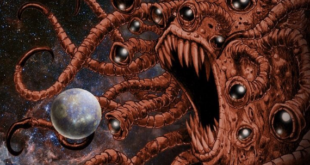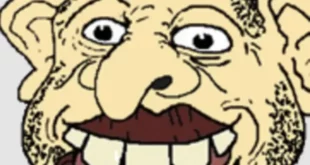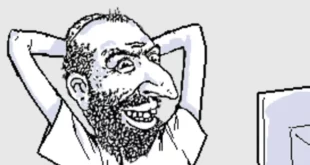Andrew Anglin
Daily Stormer
January 24, 2015

In a turn of fate that is perhaps not good or bad but simply hilarious, a prehistoric relic of an age beyond time itself, Fatou Bensouda, has been appointed decision-maker in the International Criminal Court’s case of Israeli war crimes charges.
She is clearly an affirmative action hire, placed in this position because the ICC was so often prosecuting Africans, who are incapable of understanding the basic concept of morality, let alone laws and courts, and so often run afoul of the international legal system.
Interestingly, Haaretz has a very high opinion of her:
The past week’s legal and diplomatic storm has focused on the decision by one highly esteemed woman, whose decisions in the coming years are likely to shape the legal and political course of the Israeli-Palestinian conflict.
International Criminal Court Prosecutor Fatou Bensouda, who assumed the position in June 2012, is the second person to hold the post, having served as the court’s deputy prosecutor for eight years. Bensouda’s rich experience in international criminal law began when she served in several senior positions in the International Criminal Tribunal for Rwanda. The Rwanda tribunal, alongside the International Criminal Tribunal for the former Yugoslavia, were the two ad-hoc international criminal courts set up in the 1990s that foretold the formation of the ICC, which began operating in 2002.
Prior to her appointment to the Rwanda tribunal, Bensouda had a rich legal background in her home country, The Gambia, where she filled a series of senior roles, including state prosecutor and attorney general. After completing her legal studies in Nigeria, she earned a master’s degree in international maritime law in Malta. In 2012, Time Magazine named her among the world’s 100 most influential people, writing, “Thoughtful, soft-spoken, yet determined and forceful, Bensouda has been a leading voice pressing governments to support the quest for justice, particularly in Africa.”
Bensouda was born in 1961 to a polygamous Muslim family. Her father had two wives, and she was raised by her mother and her father’s other wife in an expanded family. She has over a dozen brothers and sisters.
“One thing that really made me [want to become a lawyer] was the fact that I realized that there were not many female lawyers,” Bensouda told the American network PBS several years ago. “And I also saw that there were a lot of issues affecting gender and children, which I thought I should be able to play a huge part in presenting it before the court and standing up for them.”
Her prime conviction, she emphasized throughout the interview, was to act on behalf of victims. The ICC, she said, reflected the idea of a “common bond” among the international community. Until its formation, perpetrators of atrocities effectively had impunity, she noted.
“I think perpetrators of these crimes do know that they can be held accountable. There is a court in existence now. A court is not going to be established after they have done whatever they have done. It is in existence. And I think that, in itself, sends a message that there is going to be accountability … Impunity is going to end.”
She tends to reject criticism that the ICC is a European court investigating African countries and a repeat of the colonial relationship. “Africa has the largest number of countries in any one continent to be members of the court,” she pointed out. “They wanted this court to be created, because Africa was also sending a signal that we also want to end impunity and through this court we think we can achieve that.”
She noted that all eight cases currently before the court related to African countries, four of which originated in the African countries themselves, who asked the court to intervene, and two (Sudan and Libya) after being referred by the United Nations Security Council. Only in two countries, Kenya and the Ivory Coast, had Bensouda herself initiated the legal process.
As the story goes, she was found when a team on a routine expedition experienced the greatest earthquake ever known, high on the rapids. They brought her back to run the world war court.
Alternatively…
 Daily Stormer The Most Censored Publication in History
Daily Stormer The Most Censored Publication in History


